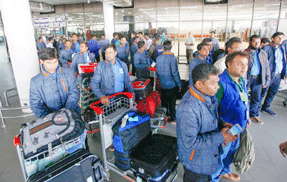Goa is abuzz with excitement as vintage bike and car owners, users, collectors and fans are decking […]

ILLEGAL MIGRANTS CHEATED IN GULF – By T S Sudhir
Migration December 10, 2021ILLEGAL: As in UK, illegal migrant workers not only face the risk of being evicted, but have little bargaining power when it comes to jobs or living conditions.
Do not risk travelling to the Gulf on a tourist visa on the false promise of a highly paying job. You may not only lose your money but find yourself forced to work for lower wages for long hours.
By T S Sudhir
THE UNEASE showed in their body language. Twenty-year-old Rajender was meeting his father Gummula Mallaiah after a gap of eleven years and the lack of disconnect between them was obvious. Mallaiah had just landed at Hyderabad after having been declared ‘persona non grata’ in Dubai, an illegal immigrant in the land of opportunities. This mason from Karimnagar district of Andhra Pradesh, whose Indian passport had expired in 2009, was living on borrowed time, violating local residency laws. With his health failing, he decided not to run away from the law of the land anymore and applied for amnesty with the UAE government. Dubai took no time in deporting him back to India this week.
In another part of the arrivals lounge at the Hyderabad airport, 15-year-old Saikumar hugged his father Y G Venkateswar, the lump in the throat and their wet eyes, saying much more than any words would. The 36-year-old from Nizamabad district had gone to Dubai seven years ago, only to realise on landing that the agent who had pocketed 1.20 lakh rupees for arranging the visa and work permit, had led him up the garden path. “He told me I will get a salary of 800 dirhams every month but they gave me only 350 dirhams. I quit the job after three and a half months, freelancing as daily construction labour for 50 dirhams a day,” says Venkateswar. This means that for over six years now, he has been an illegal immigrant. With no regular work coming his way in the last one year, Venkateswar decided to take the UAE government’s amnesty offer and head back home. Because the other option would have been prison.
Almost every illegal immigrant worker’s story is a xerox copy of the other. The Gulf dream beckons because a brother, a neighbour, a relative is seen to have made it big. The harsh reality of low salary, inhospitable living conditions and home sickness dawns only after landing there but then it is impossible to return because there are loans to be paid off. Of the 1.8 million Indians working in the UAE, 45,000 are illegal immigrants, overstaying without valid documents and violating local residency laws. They have either gone on a visit visa and started working there or run away from their sponsor like Venkateswar. The majority of these irregular immigrants are males, employed in the construction sector (40,000), the remaining 5,000 being female domestic help. Andhra Pradesh (18,000) and Kerala (approximately 15,000) form the largest group of these migrants.
AMNESTY SCHEME
The UAE government announced an amnesty scheme for illegal immigrants in December, offering the option of returning to their country within two months or prison, if they could not get their status regularised. However, only one thousand Indians applied, despite the fact that most of them are unskilled and would find getting jobs in the UAE difficult. But the temptation to stay on, hoping not to get found out is high, since conditions back home would be as bad if not worse. In 2007, the Overseas Indian Affairs ministry estimated some 40,000 Indians returned when a similar amnesty scheme was announced by the UAE government. The Andhra Pradesh government then sponsored the return tickets of some 1,200 of them to Hyderabad. Many of them subsequently found it difficult to adjust to life in their villages and nearly 150 of those who returned either committed or attempted suicide.
Activists working for the welfare of the Gulf returnees in Andhra Pradesh are citing the Kerala example whose money order economy for long has depended on remittances from the Gulf. The Oommen Chandy government in Kerala is providing free air tickets to Malayalee illegal immigrants. In Andhra Pradesh however, despite several appeals, it has been a case of out of sight, out of mind for the political establishment. “Each ticket costs between 9,000 to 15,000 rupees. In some cases, we could get some NRIs to sponsor the airfare. Not having money even to buy a ticket is another reason why many are choosing to stay underground in Dubai, Sharjah or Abu Dhabi,” says P Laxman of the Andhra Pradesh Social Security Board.
The Migrants Rights Council of India which is engaged in providing help to the unorganised migrant labour says the Gulf tacitly encourages cheap labour that is further exploited by contractors and middlemen. “There are 60 lakh Indians in all the Gulf countries today. There are several who are in prison and many who have died and been buried there or worse, whose bodies are lying unclaimed in the mortuaries,” says M Bheem Reddy of the Migrants Rights Council. Three months back, I watched the immigration officer at the Hyderabad airport grill a person standing in the queue before me. The person was bound for Dubai on a visitor visa. “Why are you going to Dubai?” “Bhai wahan kaam karta hai. Milne ja raha hoon,” he said. (My brother works there. I am going to visit him.) “That is what everyone says. Will you return?” “Haan” (Yes) “He will not return, mark my words,” the officer said to me, shaking his head. May be he will, some years later, in another edition of the Return of the Native.
Courtesy: First Post















